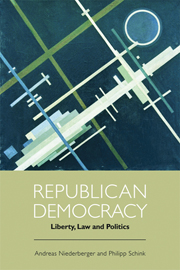Book contents
- Frontmatter
- Contents
- List of contributors
- Introduction
- 1 The Tension between Law and Politics in the Modern Republican Tradition
- 2 Impotence, Perspicuity and the Rule of Law: James Madison's Critique of Republican Legislation
- 3 Kant, Madison and the Problem of Transnational Order: Popular Sovereignty in Multilevel Systems
- 4 Republicanism and Democracy
- 5 Two Views of the City: Republicanism and Law
- 6 A Kantian Republican Conception of Justice as Nondomination
- 7 Two Republican Traditions
- 8 Freedom, Control and the State
- 9 Legal Modes and Democratic Citizens in Republican Theory
- 10 Rights, Republicanism and Democracy
- 11 Republicanism and Global Justice: A Sketch
- 12 Republicanism and Transnational Democracy
- Index
Introduction
Published online by Cambridge University Press: 05 October 2013
- Frontmatter
- Contents
- List of contributors
- Introduction
- 1 The Tension between Law and Politics in the Modern Republican Tradition
- 2 Impotence, Perspicuity and the Rule of Law: James Madison's Critique of Republican Legislation
- 3 Kant, Madison and the Problem of Transnational Order: Popular Sovereignty in Multilevel Systems
- 4 Republicanism and Democracy
- 5 Two Views of the City: Republicanism and Law
- 6 A Kantian Republican Conception of Justice as Nondomination
- 7 Two Republican Traditions
- 8 Freedom, Control and the State
- 9 Legal Modes and Democratic Citizens in Republican Theory
- 10 Rights, Republicanism and Democracy
- 11 Republicanism and Global Justice: A Sketch
- 12 Republicanism and Transnational Democracy
- Index
Summary
In many histories of political thought modernity appears as the inevitable triumph of liberal ideas. However, since the 1950s the academic discourse has also continuously been engaged with republican ideas and themes in various fields. The common core of the different positions usually associated with this republican revival in political and legal philosophy, in history and political science, consists in rejecting the central tenets of liberal political thought and denying their exclusive importance for modern politics. Motivated by a profound dissatisfaction with contemporary politics in the Western world the republican agenda aims to thoroughly develop a strong normative alternative to liberalism. Liberalism, in this view, is mainly identified with a certain type of possessive individualism, secured via a system of basic rights. Most of the contributors to the republican revival of the last fifty years argued that such a normative program is oblivious to the political and legal conditions necessary for peaceful, free, just and democratic coexistence. Republican – or neo-republican, as some label it – political thought, thus puts the ideas of the common good, citizenship and a revised understanding of freedom at the center of political theory again and reconsiders the sense and importance of politics, law and statehood in light of these three points of reference.
- Type
- Chapter
- Information
- Republican DemocracyLiberty, Law and Politics, pp. 1 - 4Publisher: Edinburgh University PressPrint publication year: 2013

